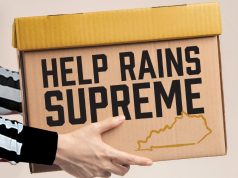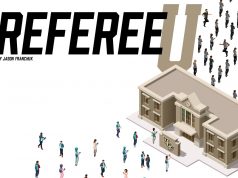A
ll sports officials are potential targets for criticism. When we don a striped shirt and pick up a whistle, we understand criticism comes with the job. “Call it the same both ways,” is a common refrain. “That was horrible,” is another. Sometimes the remarks get pointed and personal; someone will tell us, “You are an absolute disgrace.” We hear the comments, do our best to ignore them and soldier on. But when do the comments and criticisms become something more, something potentially dangerous? Is it when someone follows us to the parking lot and berates us? Is it when someone in a near-empty gym yells, “I ought to kick your ass”?
Over the past several decades some states have enacted legislation dealing with the physical assault of officials, but legislative threats to deal with verbal intimidation have largely been lacking, unless that intimidation is coupled to physical assault.
However, that mindset is starting to change. Lawmakers in several states are wrestling with the question and considering legislation that would make it illegal to harass sports officials on the youth through college level.
One state has already enacted such legislation. In June 2019, Louisiana Gov. John Bel Edwards signed a bill into law that specifically addressed the harassment of sports officials. The new law took effect in August that same year. It defines harassment as “verbal or non-verbal behavior by the offender that would cause a reasonable person to be placed in fear of receiving bodily harm.” The maximum penalties include a fine of $500 and up to 90 days in jail. In addition, an offender must perform 40 hours of community service work and participate in a court-monitored anger management or similar program.
State Sen. Cameron Henry (R-9) brought the bill to the floor in the Louisiana Senate. In remarks to the Louisiana High School Athletic Association (LHSAA) he made it clear the measure was not an attempt to stifle criticism of officials.
“This bill isn’t to prevent a parent to express concerns about a call they feel is wrong or invalid,” he said. “We understand a parent will always protect their child and express concern if they feel their kid has been robbed of a play or an opportunity to win the game. The problem begins when the concern turns into a threat of violence and could jeopardize the safety of the officials or others.”
Paul LaRosa, president of the Louisiana High School Officials Association, says the organization joined forces with the LHSAA to build support for the measure among lawmakers. Concerns about sportsmanship fueled the effort. LaRosa said there were concerns about problems at youth/rec league events.
“There were a growing number of incidents where parents and fans at kids’ games were engaging in inappropriate behavior,” he began, “that caused officials and other parents to say, ‘This is out of control.’”
Legislation like the Louisiana statute has been proposed, and in some cases introduced, in several other states. While the language of each measure varies, the intent is similar: to offer officials protection against those who might threaten them or their families, while at the same time making a distinction between what is constitutionally protected free speech and what is not.
In general legal terms, harassment is defined as a verbal encounter or confrontation as opposed to assault, which involves a physical confrontation or an attempted one.
The Wisconsin legislature considered a bill that would make harassing sports officials a crime punishable by a fine of up to $10,000 and up to nine months in jail. However, it failed to pass.
In January, a bill was introduced in the Kentucky state House that would classify the intimidation of a sports official as a Class A misdemeanor, punishable by up to 12 months in jail. It passed 92-4 in the House, but failed to get out of the Senate Judiciary Committee.
The bill said a person is guilty of intimidation of a sports official when they, directly or indirectly, make any threat to a sports official “with the intent of causing them to commit, make or delay any act, decision or determination regarding a sports contest.”
The same legislation would also have made assault of a sports official a Class A felony, as opposed to a misdemeanor, with a maximum penalty of one to five years in state prison.
The Hawaii legislature is considering revisions to the state’s assault statutes that specifically prohibit the assault of someone acting as a sports official and terroristic threats against an official; terroristic threat being defined as a threat to cause bodily harm. The latter would be considered a Class C felony, punishable by up to five years in prison and a fine of up to $10,000.As of this writing, the measure was being considered by that body’s Judiciary Committee.
The measures being debated in the various venues have received some bipartisan support from legislators. The final version of the Louisiana bill passed unanimously in the state Senate and garnered only a single negative vote in the House.
In Pennsylvania, State Rep. Anita Astorino Kulik (D-45) found several co-sponsors for a bill that would address the harassment of officials that she plans on introducing in the fall session. Rep. Kulik represents a district in suburban Pittsburgh. Her proposed bill would amend a section of the Pennsylvania Crimes Code to include a section pertaining to the harassment of sports officials. Sports officials would be defined as not just a game official but also table personnel, a game manager, athletic director or anyone else responsible for enforcing rules and regulations at an athletic event.
Kulik is intimately familiar with the harassment issue; she is married to a longtime football official who at one time also was an assigner. Her son also officiated football for a time.
She assisted her husband with the logistics of assigning until she was elected to the Pennsylvania House in 2016 and no longer had the time to do so. Following her election, her husband gave up his assigning duties.
“I have talked to many sports officials,” Kulik said. “I have seen them physically assaulted. I’ve seen a lot of situations and heard of a lot of situations where sports officials have been harassed.”
Like LaRosa, Kulik is particularly concerned with how incidents of harassment of officials impact the participants in the games in which they occur.
“Most of the games have children involved,” she points out. “And we’re teaching our children that it’s OK to blame the referee, yell at the referee, harass the referee.”
Kulik emphasizes she is not trying to place restrictions on free speech.
“You’re still going to be able to sit in the stands and say, ‘Hey ref, that was a bum call,’ or, ‘Hey ref, get a pair of glasses.’ Nobody is taking your right of free speech away from you,” she said. “Our aim is to prevent somebody from following an official to the car after the game and verbally harassing them.”
She added the sports environment must get to the point where officials are not being threatened with violence, verbally harassed incessantly or having police escorts to cars because someone is threatening them. Kulik’s proposed legislation is a long way from becoming a reality and bills formally introduced around the country must be navigated through the legislative labyrinth in each state.
But the new law now in place in Louisiana has had an impact and has resulted in a new protocol for high school officials in the state. LaRosa says the idea is to head off potentially volatile situations before they reach a flashpoint.
“The bill, in our minds, created more of a responsibility for our officials to be professional and to do certain things to avoid situations where this law would come into play,” LaRosa said. “So, what we instituted was a more rigorous process of pregame administrative meetings with the administrative people at games, where everyone understood who is responsible for what, security, etc. That is something that we were probably a little lax on in the past. We really emphasize the importance of our officials meeting with the right people before the game and making sure everyone understood their responsibilities, specifically for security. I think the bill helped us sell that to our officials. Everyone understands we’ve got something on our books now where people can actually be arrested and no one wants that.”
Areas of concern still remain. In 2013, two members of LaRosa’s local association requested assistance from a law enforcement officer to deal with a crowd-control situation on the sideline — and wound up being arrested themselves (12/13 Referee). Since then, LaRosa has made it a point to let game administrators address any onfield event that occurs outside the team boxes.
Then there is the question about how security issues after a game should be addressed.
“We had a crew of officials go to their cars,” LaRosa began. “There was a security guy available. They got to their cars outside the gates getting ready to leave and a guy shows up and he is threatening to blow my brains out. As officials, how do we manage that situation? We still have this issue of what’s appropriate security for officials. When does it start? When does it end? We’re still kind of struggling with that piece.”
That struggle LaRosa describes is ongoing. The issue of verbal harassment/threats toward officials is not going away anytime soon. Some of the bills now being considered may become law. Others will die in their respective state legislatures. The fact these types of bills are being introduced is a reminder that these types of threats do happen, but having them debated is an encouraging sign that there are individuals within and outside the officiating industry willing to stand up and say, “These kinds of comments will not be tolerated.”
A Societal problem
The concept of dealing with threatening speech, i.e. harassment via legal statute, is a concept NASO Founder and President Barry Mano says is a recent phenomenon.
“The harassment thing was brought to us,” he said. “It’s not something that we went out and tried to export. It was really imported.” Louisiana was the first state to address it with legislation and then other states made similar efforts.
“I know that Wisconsin got involved and so that really brought us into the mix because we’re here in Wisconsin,” Mano said. “I think it’s coming out of the reality that sports fans are engaging in more harassment of sports officials, especially at the youth level, and also in some measure at the high school level.”
Mano believes the increase in harassment incidents is due in part to societal issues.
“I think we’re brash or louder than we have been historically,” he said, “and I think we have a developing disdain for authority figures, so referees get swept up in that.”
Mano believes the increasing use of video review is a factor as well. “The use of that technology at the upper levels has the unintended consequence at lower levels of people wanting to have what they feel is an incorrect call redressed,” he said. “We see that, we hear that.”
Paul LaRosa, who heads the Louisiana High School Officials Association, says verbal abuse of officials throughout the state increased in the aftermath of the controversial non-call near the conclusion of the 2018 NFC Championship Game that fans believed cost the New Orleans Saints a Super Bowl trip.
“If they were going to a basketball or baseball game, they were going to take out their frustration on the officials,” he said. “I don’t know if I can point to any single thing beyond that. It just seems like there was this growing mentality that people feel, ‘I have the right to express my opinion.’ Which is OK, but now it’s following people to cars and threatening to kick their butts. That’s not OK.”
What's Your Call? Leave a Comment:
Note: This article is archival in nature. Rules, interpretations, mechanics, philosophies and other information may or may not be correct for the current year.
This article is the copyright of ©Referee Enterprises, Inc., and may not be republished in whole or in part online, in print or in any capacity without expressed written permission from Referee. The article is made available for educational use by individuals.

















